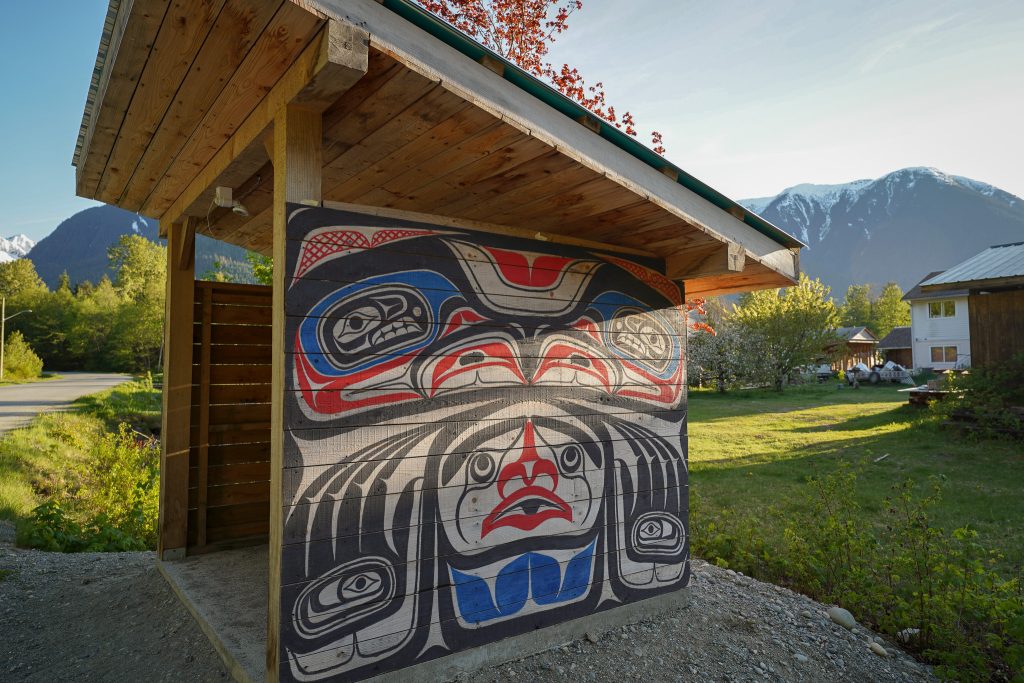The Indigenous Homelands Program aims to break down barriers for community members from remote First Nations to be able to return to and thrive on their homelands, in ways that honour their cultural, social, economic, and environmental well-being. The Homelands program addresses systemic challenges with Nation-specific solutions that centre on community well-being.
We work on research and on-the-ground community-led projects, and have produced several knowledge tools, with a focus on four key pillars: decolonial governance, land stewardship, circular economies, and holistic housing. By cultivating long-term relationships and building connections to collaborate on Indigenous housing and homelands, we are supporting Nations to achieve greater sovereignty over their homelands.
The challenge
Systemic barriers rooted in colonial systems are preventing Indigenous community members from returning to and thriving in their homelands. While housing shortages are visible symptoms, the crisis runs much deeper.
As the Indigenous population in Canada grows at almost twice the pace of the non-Indigenous population, housing demand far exceeds Indigenous governments’ capacity to build appropriate homes. Yet this shortage exists within interconnected challenges: without meaningful employment, youth cannot return home; without relevant training, they cannot access local jobs; without safe, culturally appropriate housing, employment becomes irrelevant.
While funding remains critical, our research has found that sustainable and culturally relevant housing solutions depend on community-led governance, holistic approaches to “home” and well-being, and closer collaboration between government, Indigenous leadership, and civil society groups.
What is possible
Community members from remote First Nations can return to and thrive in their homelands in ways that honour their social, cultural, and environmental well-being.
Over the next five years, our partnerships will prove the possible by:
- Facilitating long-term community-led housing and infrastructure projects that are climatically and culturally relevant, and that focus on the diverse social needs of community members.
- Creating more sustainable circular
economies by building regional housing supply chain networks. - Supporting Indigenous sovereignty by enabling culturally based decolonial governance through innovations in land tenure and land management models.
Why Ecotrust Canada?
Ecotrust Canada has partnered with rural, remote, and Indigenous communities for over 30 years. The Indigenous Homelands Program has roots in a 2008 partnership with Nuu-chah-nulth First Nations communities on the Standing Tree to Standing Home initiative. Together, we envisioned a circular economy that integrated forest management, community design, value-added production, construction, and training to build local housing. More recently, we facilitated workshops with the Huu-ay-aht First Nations, the Tŝilhqot’in Nation, and the Nuxalk Nation to help identify, understand, and test solutions toward housing, land tenure, and governance challenges in their communities and territories.
Homelands has developed several informative toolkits and resources for communities planning housing projects. With the Yuneŝit’in First Nation, we created a Monitoring and Evaluation Tool to generate new project ideas and offer a simple, intuitive way for staff and decision-makers to recall community priorities and goals. In 2022, we released the Indigenous Housing and Homelands Toolkit designed to support First Nations in understanding what possibilities exist for culturally legitimate housing and lands governance, particularly within the context of Indigenous title lands, modern treaty lands, and other emerging jurisdictions in British Columbia.
Committed to Indigenous self-determination, Homelands is an innovative platform for change that mobilizes local skills, expertise, Indigenous knowledge systems, and territorial assets to create vibrant, healthy housing ecosystems.
“The reason I am involved in leadership work is to ensure that I am contributing my part to the next generation and the territory. Ecotrust Canada has been an inspirational partner in this journey by challenging the status quo and building innovative solutions with me.”
– Carrigan Tallio, Program Manager and Nuxalk Nation member
How to support us
If you are from an Indigenous community and want to learn more about the Indigenous Homelands Toolkit, reach out. Or, donate directly to our Indigenous Homelands work at Ecotrust Canada.
Projects
Stories
- Breaking Down Silos: The Need for Collaborative Action in Indigenous Housing
- Routes to Roots: Revitalizing traditional corridors of exchange
- Imagining a thriving housing landscape with Nuxalk members in Bella Coola, BC
- Standing for Nature – Giving natural territories the status of a legal person
- Why We Exist: A new era for the Indigenous Homelands Program
- Emerging conversations from an Indigenous Housing Gathering
- Visiting Yuneŝit’in, where the Forest to Frame supply chain is coming to life
Research/Publications
- From Forest to Frame: A Resource for First Nations Exploring a Do-It-Yourself Approach to Housing
- Indigenous Housing Solutions Labs: a new approach to tackling complex Indigenous housing challenges
- Yuneŝit’in First Nation Project Monitoring + Evaluation Tool
- Housing Ecosystem Overview Strategy Development Guidance Report
The team
Ashli Akins, Director
Carrigan Tallio, Program Manager
Kia Dunn, Law and Policy Lead
Jalissa Schmidt, Indigenous Education Specialist
Becky Hill, Graphic Designer
Clarissa Samson, Socioeconomic Lead

